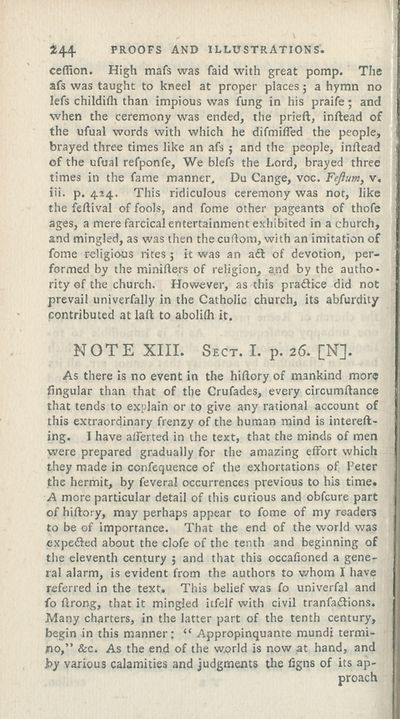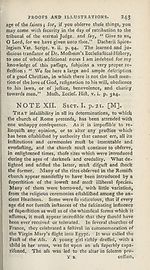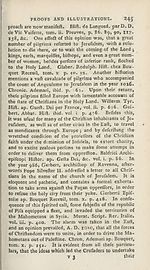Download files
Complete book:
Individual page:
Thumbnail gallery: Grid view | List view

244 PROOFS AND ILLUSTRATIONS.
ceffion. High mafs was faid with great pomp. The
afs was taught to kneel at proper places ; a hymn no
lefs childilh than impious was fung in his praife; and
when the ceremony was ended, the prieft, inftead of
the ufual words with which he difmified the people,
brayed three times like an afs ; and the people, inftead
of the ufual refponfe, We blefs the Lord, brayed three
times in the fame manner. Du Cange, voc. Feftum, v.
iii. p. 414. This ridiculous ceremony was not, like
the feftival of fools, and fome other pageants of thofe
ages, a mere farcical entertainment exhibited in a church,
and mingled, as was then the cuftom, with an imitation of
fome religious rites ; it was an adt of devotion, per¬
formed by the minifters of religion, and by the autho¬
rity of the church. However, as this pradtice did not
prevail univerfally in the Catholic church, its abfurdity
contributed at laft to abolith it.
NOTE XIII. Sect. I. p. 26. [N].
As there is no event in the hiftory of mankind more
lingular than that of the Crufades, every circumftance
that tends to explain or to give any rational account of
this extraordinary frenzy of the human mind is intereft-
ing. 1 have afterted in the text, that the minds of men
were prepared gradually for the amazing effort which
they made in confequence of the exhortations of Leter
the hermit, by feveral occurrences previous to his time.
A more particular detail of this curious and obfeure part
of hiftory, may perhaps appear to fome of my readers
to be of importance. That the end of the world was
expefted about the clofe of the tenth and beginning of
the eleventh century 5 and that this occafioned a gene¬
ral alarm, is evident from the authors to whom I have
referred in the text. This belief was fo univerfal and
fo ftrong, that it mingled itfelf with civil tranfadlions.
Many charters, in the latter part of the tenth century,
begin in this manner: “ Appropinquante mundi termi-
no,” &c. As the end of the world is now at hand, and
by various calamities and judgments the figns of its ap¬
proach
ceffion. High mafs was faid with great pomp. The
afs was taught to kneel at proper places ; a hymn no
lefs childilh than impious was fung in his praife; and
when the ceremony was ended, the prieft, inftead of
the ufual words with which he difmified the people,
brayed three times like an afs ; and the people, inftead
of the ufual refponfe, We blefs the Lord, brayed three
times in the fame manner. Du Cange, voc. Feftum, v.
iii. p. 414. This ridiculous ceremony was not, like
the feftival of fools, and fome other pageants of thofe
ages, a mere farcical entertainment exhibited in a church,
and mingled, as was then the cuftom, with an imitation of
fome religious rites ; it was an adt of devotion, per¬
formed by the minifters of religion, and by the autho¬
rity of the church. However, as this pradtice did not
prevail univerfally in the Catholic church, its abfurdity
contributed at laft to abolith it.
NOTE XIII. Sect. I. p. 26. [N].
As there is no event in the hiftory of mankind more
lingular than that of the Crufades, every circumftance
that tends to explain or to give any rational account of
this extraordinary frenzy of the human mind is intereft-
ing. 1 have afterted in the text, that the minds of men
were prepared gradually for the amazing effort which
they made in confequence of the exhortations of Leter
the hermit, by feveral occurrences previous to his time.
A more particular detail of this curious and obfeure part
of hiftory, may perhaps appear to fome of my readers
to be of importance. That the end of the world was
expefted about the clofe of the tenth and beginning of
the eleventh century 5 and that this occafioned a gene¬
ral alarm, is evident from the authors to whom I have
referred in the text. This belief was fo univerfal and
fo ftrong, that it mingled itfelf with civil tranfadlions.
Many charters, in the latter part of the tenth century,
begin in this manner: “ Appropinquante mundi termi-
no,” &c. As the end of the world is now at hand, and
by various calamities and judgments the figns of its ap¬
proach
Set display mode to:
![]() Universal Viewer |
Universal Viewer | ![]() Mirador |
Large image | Transcription
Mirador |
Large image | Transcription
| Antiquarian books of Scotland > Kings & rulers > History of the reign of the Emperor Charles V. > Volume 1 > (262) |
|---|
| Permanent URL | https://digital.nls.uk/109185475 |
|---|
| Description | By William Robertson. London : Cadell and Davies, 1798. |
|---|---|
| Shelfmark | ABS.1.76.13 |
| Additional NLS resources: | |
| Description | Thousands of printed books from the Antiquarian Books of Scotland collection which dates from 1641 to the 1980s. The collection consists of 14,800 books which were published in Scotland or have a Scottish connection, e.g. through the author, printer or owner. Subjects covered include sport, education, diseases, adventure, occupations, Jacobites, politics and religion. Among the 29 languages represented are English, Gaelic, Italian, French, Russian and Swedish. |
|---|

